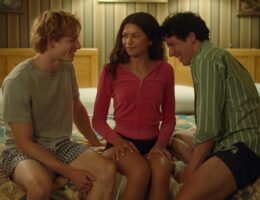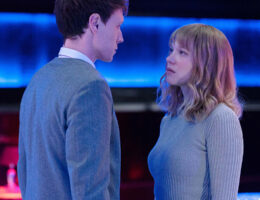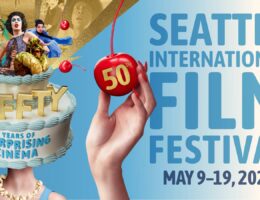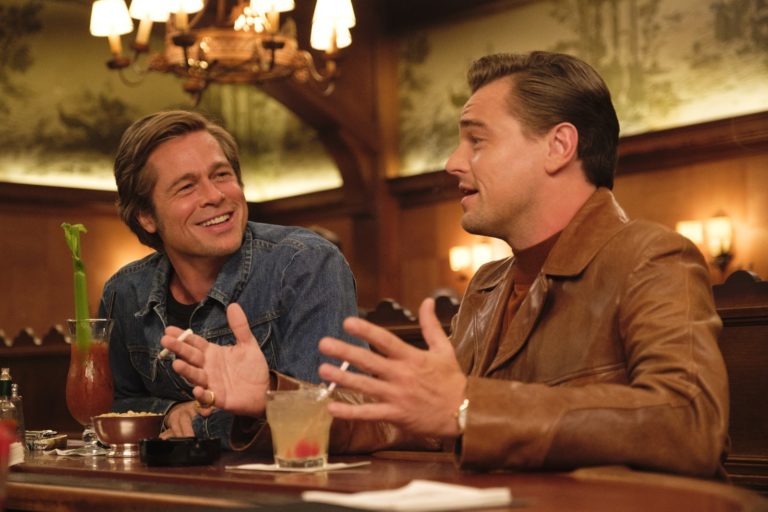Quentin Tarantino’s much anticipated Once Upon a Time … In Hollywood premiered at Cannes this spring and began wide release last weekend. We all saw it last week and were excited to talk about it, roundtable-style.
Broadly, the fable takes place over a handful of days in Hollywood in the late 1960s. We meet leading man Rick Dalton (Leonardo DiCaprio, committing fully) and his stunt double Cliff Booth (Brad Pitt, weathered but still too pretty to be a stuntman) on the set of their successful television serialized Western where they’re doing a throwaway network interview, pouring on the charm. Skipping ahead a few years and it’s suddenly 1969, and the times they are a’ changing. Having struggled to make the leap onto the silver screen after what constituted a successful television stint, Rick is meeting a producer in a bar (Al Pacino) who warns against his current trajectory of settling for reputation-diminishing guest appearances as a bad guy who loses fights (it’s a real concern!) and pitches him on a career reboot in Rome as a veritable hero in Spaghetti Westerns. Meanwhile, with Rick’s career on the wane, his buddy Cliff has found his himself cast more often as a driver and gopher than performing dangerous feats on set.
As the title suggests, the film takes place in Hollywood and is about Hollywood, in particular a Hollywood at an inflection point as viewed through the lens of a fictional star coming to terms with the limits of both his potential and the industry’s interest in him as a celebrity. Taking place in Los Angeles, real estate, public and private, and the long stretches between landmarks in a sprawling city is truly a character. Even in the increasingly desperate doldrums of pilot season, Rick reassures himself with the prestige of home ownership in the Hollywood Hills, which marks this dreamer as a true Angeleno with a sense of credibility, a lack of transience, a badge of industry investment, and just maybe even a chance to catapult his career via a serendipitous meeting. For instance, with his new neighbor Roman Polanski who’s recently bought a place just up the hill and moved in with his bride Sharon Tate (Margot Robbie). Cliff is less fortunate in this regard. When his erranding, drinking, and television watching in the Hills are done, he goes home to an airstream behind a drive-in where his loyal dog awaits a sloppy canned dinner (“Wolf Tooth” available in rat and racoon flavors) to enjoy while he eats Easy Mac from the pot.
There’s an incredible amount of driving around Los Angeles, from iconic restaurants, classic theaters, the gorgeous neon signs lighting up at dusk, each with the perfect musical accompaniment, a paradoxically obscure and instantly recognizable. The movie unfolds slowly and lovingly, essentially with a day in the life of each of our three heavies.
Rick spends a day on the set of Lancer, berating himself every time he flubs a line, reminiscing and reimagining the past with series star James Stacy (Timothy Olyphant, who’s also made a name for himself in law-enforcement serials IRL), sharing a tender moment with a child actor played by Julia Butters (just the right amount of precocious), and grinding out a bravura performance. Meanwhile, Cliff is sidelined to a rooftop home repair task back at Rick’s house (giving Pitt an opportunity to practice parkour and show-off his perfectly tanned and toned body), daydreaming about his own past misadventures (a fight sequence with Mike Moh as Bruce Lee is the film’s most out-of-touch), and giving a hippie hitchhiker a ride out to the once-iconic Spahn Ranch (abandoned by Hollywood and recently inhabited by the Manson Family, leading tourists on horseback rides and paying their rent through sexual manipulation) to check in on an old friend (Bruce Durn, hilariously crotchety) now in thrall to the new tenant (Dakota Fanning, creepily intimidating as Lynette “Squeaky” Fromme). Finally, we follow Sharon Tate on a relatively uneventful day, picking up books (gifts and role preparation) and dropping into a local cinema for a truly lovely sequence in which she watches herself onscreen in the Wrecking Crew, soaking up the crowd’s reactions and recollecting her time training (with Bruce Lee, far less cartoonish in her memory). Each of these sections is a hall of mirrors, packed with wormholes of flashbacks and re-imaginings that contain entire adjacent universes of the real and imaginary co-existing. They’re likely to mean more to aficionados of Hollywood history, but also play well to audiences coming in without Wikipedia-levels of knowledge.
The needle jumps again, the narrator’s back, the film swoops quickly through Cliff and Rick’s adventures in Italian filmmaking, nuptials, career reformulation, and right into a fateful summer evening in 1969 with parallel dinners at storied LA Mexican restaurants (Sharon Tate and Jay Sebring’s real one at El Coyote; Rick and Cliff drinking themselves stupid at Casa Vega). As the night wears on Tarantino’s meticulous period accuracy tilts into a historical re-imagining when a home invasion is undone by a loud car, a drunken owner’s pitcher of frozen margs, a well-trained canine, and a sentimental film prop, all culminating in an acid-dipped spree of extremely (satisfying) graphic violence. ☆☆☆☆½
I thought it was a deeply enjoyable ride, among my favorite films of the year so far, but wanted to bring the rest of the crew in to see how they responded.
So let’s get into it — what did you guys think?
Tony: Over the 25+ years that Quentin Tarantino’s been making movies, I’ve readily, joyfully followed wherever his hyperstylized, motormouthed, movie-obsessive muse has taken him. His films are often flawed, meandering, and so cinematic Inside-Baseball that I’m surprised he doesn’t alienate an even-larger portion of the moviegoing public. But few active directors today somehow manage to garner a sturdy bed of critical acclaim, cult idolatry, and gangbuster box office in equal turns–all while doing precisely what the hell they feel like. So, it’s hard for me to not go into a QT joint expecting the moon. Simply put, from my perspective he’s always delivered it. But at first blush, Tarantino’s newest is doing something that none of his other films have done to me: It’s left me a little cold, a bit bored, and quite disappointed.
The fact that I’m ambivalent about Once Upon a Time…In Hollywood, and that I feel like it’s his most indulgent, dramatically inert, and least interesting feature to date has me feeling a little like my movie-geek world’s been knocked off of its axis. Tarantino’s movies genuinely appreciate through multiple viewings for me, and having only seen OUAT…IH once, I feel almost like I’m going in half-cocked. So I’m giving the man the benefit of the doubt, as I adore his work so much. It’d be no stretch for my assessment to shift pretty radically on a repeat go-’round. And I’m aching to see it again.
Josh: I am shocked! This is not the result I anticipated. In contrast, my general position going into any Tarantino film, with the prospect of hyper-referentiality and self-satisfaction, is optimistic yet guarded skepticism. But I found it very easy to love Once Upon a Time … In Hollywood. It felt easily among his more loving and accessible, and one that I eagerly anticipate re-watching to luxuriate in all of the details.
Chris: I think I’m the most bullish on OUAT…IH here. I found myself loving a lot of it, that unfortunate and ill-advised Bruce Lee scene being a notable exception. I’ll dispense with that first, because it was the most jarring. I genuinely believe QT is a Bruce Lee fan, so for him to be treated as such a parody was mind-boggling. Mike Moh was outstanding with what he had, but Tarantino treated him as a punchline. Even on “Historical Roasts,” was Bruce Lee given more deference.
Josh: Yeah, it got a lot of laughs, either for agreement or awkwardness. I don’t really understand why it’s in the movie other than to show that Pitt’s character can handle himself in a scuffle and has benefitted from Leo’s largesse and friendship to overcome the better instincts of set coordinators. Otherwise he would’ve been out of work long before. Maybe we don’t expect cultural sensitivity from Tarantino, but this scene really stood out as being out of character with the rest of the film.
Chris: For me, the movie hit its stride when Cliff Booth visits Spahn Ranch, probably the last 45 minutes, or so. It was so uncomfortable seeing Booth visit the dying George Spahn, but I think it set the tone for just how creepy the Manson Family was. Dakota Fanning’s Squeaky Fromme’s nonchalance of why Spahn was particularly tired that day will continue to haunt my nightmares. But it was also fun seeing Booth have little trouble dispensing with the violent family whose turf he invaded.
Josh: Yeah, I found that whole sequence incredibly suspenseful and unsettling. The presence of Lena Dunham among all the hippie acolytes felt both incongruous and weirdly appropriate.
Chris: Another thing I thoroughly enjoyed here was watching QT trolling Twitter from his movie set in the late sixties. Not just by giving Sharon Tate and “Pussycat” dirty feet when his foot fetish is well known, but also the gleeful joy Rick Dalton showed when seeing his neighbor is Roman Polanski and being giddy at the possibility of starring in a Polanski film. There’s zero percent chance that wasn’t deliberate.
Josh: So. Many. Feet.
The Magic of Hollywood
Josh: A thing that we all know about Quentin Tarantino is his brings a former video store clerk’s adoration of Hollywood history to everything he does. So much so that his movies often feel like a mashup of all the genre films he absorbed in his youth, references flashing faster than the average filmgoer could possibly track without the assistance of pop-up citations. I often find it exhausting. But here, the subtext is text and this fascination with location, film history, and blending fact and fiction with outsized imagination felt organic and personal.
Tony: The uber-geek in me also continues to relish how much intensive detail he puts into world-building here, but I also have issues with the movie’s look. There’s no denying Tarantino’s inserted incalculably loving details into every nook and cranny of his Hollywood fairyland, but there’s also a kind of undistinguished flatness to the exterior cinematography. It’s as if he’s shooting an earnest, revisionist TV movie version of the Manson saga, not a theatrical feature. You could view at it as a deliberate stylistic choice; Tarantino cagily applying the assembly-line generic visual style of vintage TV to a movie largely centered around a washed-up TV star. But it just made the movie feel disappointingly earthbound to me all too frequently.
Josh: See, I think that’s exactly what he’s doing and it worked for me. He’s using the conventions of these old time television Westerns that Rick Dalton rode to fame.. I don’t think that the camerawork is especially showy, but I think that if you did a side-by-side comparison you’d see just how much modern flair he’s added particularly to the television sequences and in reimaginings of The Great Escape.
Chris: I do think Tarantino’s (exhaustively documented) love of film finally led him to this point where he’s making this film. I agree with what Josh said about his films being an amalgam of all of the genres he loved. That’s for better or worse, but I always see Tarantino films as flawed but deeply entertaining objects. I don’t think I’ve ever been bored with a QT movie, and while I agree with the bulk of what Tony said, I don’t think I’d say I found much of unnecessary or superfluous.
Tony: Of course, I could be missing a lot of magic here. And I’m pretty sure that another viewing will likely put a lot of this in better perspective for me.
The Leo & Brad of it All
Tony: Not that the movie is lacking most of the great things that endear Tarantino to me (and to a metric crap-ton of other filmgoers). I’ll assert that the guy has a straight-up Midas Touch with actors, drawing oft-career-best work from them.
Josh: Oh yes, Leo and Brad are both great. Really top form, throughout. Leo’s performance embodies this sense of longing and disappointment and shaken confidence of a successful, but not successful-enough, career. And there are so many of those kind of people in show business at all levels. His moments of frustrated self-loathing, in particular, in the trailer on the day of shooting were a laugh riot.
Tony: Tarantino’s also delivered a fun, fleshed-out bit of bromantic chemistry when it comes to Di Caprio and Pitt. I love the unforced, lived-in semaphore between these two guys that, on a spiritual level at least, parallels the vibe that crackles between Paul Newman’s and Robert Redford’s storied pairings in The Sting and Butch Cassidy and the Sundance Kid. Pitt, in particular, channels Redford’s combination of laid-back zen cool and raffish movie-star charm splendidly (DiCaprio, by contrast, is likewise excellent, if way more tense and damaged onscreen than Newman ever was).
Josh: Rooftop Cliff really feels like Brad just stunting on his very best self. When you look like Brad Pitt, that kind of comfort within your own skin, scarred or otherwise, reads as very organic.
Tony: The trajectory of Leonardo DiCaprio’s Rick Dalton represents the apex of Tarantino’s microscopic eye for nuance. Dalton’s a former TV Western star who makes a go at the big screen, only to return to Hollywood greeted by a succession of humbling guest shots on series TV with his star significantly faded. Every beat and bend of Dalton’s career path is delivered with staggering density. At one point, there’s a montage of Dalton’s one-sheet posters, and they look eerily like the real thing. One trademark of those vintage posters is the tendency for the lead’s likeness to be just slightly off–with an actor’s features slightly tweaked to emphasize his ruggedness and cool. Whether Tarantino’s designers cleverly doctored existing posters or whether they painted new ones, That’s the kind of minutiae that impresses the uninitiated and bowls over obsessives like me (Full disclosure: my Amazon Prime queue is bulging with no less than 42 obscure Italian posters, so this shit matters, man).
Margot Robbie’s Sharon Tate
Josh: After the film premiered at Cannes, there was a general sense of concerned grumbling about the paucity of spoken words allocated to Margot Robbie’s Sharon Tate. But to me, a little goes a long way, and the character felt deeply considered despite having few lines. I’m not sure whether this too is some kind of deeply considered meta-textual decision on Tarantino’s part or just a reflection of his storytelling interests, but I was impressed with the performance.
Chris: By my estimate, about 40% of the criticism of this movie comes from a place of good faith, and I don’t think objections about Sharon Tate/Margot Robbie’s word count fall within that minority, because there was so much more to her character, which was omnipresent throughout the movie. I loved the scene where she goes to watch herself in The Wrecking Crew, showing what a great comedic actress Tate was, and a great foil to Dean Martin.
Tony: Robbie’s Sharon Tate represents yet another stock character–the free-spirited, enigmatic muse–and while she doesn’t garner the kind of screen time (or, honestly, the full realization) of some of Tarantino’s other female characters, you pinned how much Robbie makes with what she’s got. That scene of Tate in the theater, keenly observing, and then just giving in to the giddy joy of, seeing herself larger-than-life on a big screen, is easily one of my favorite dialogue-free scenes in a QT joint. There’s an awful lot revealed in her character in those few minutes.
Josh: Oh, I agree. When she talks her way into a cinema to watch herself in the middle of the afternoon, the ensuing shots of her joy at hearing audiences react to her laugh lines and the palpable sense of her thrill at being in the midst of a career on the rise, it’s one of the film’s loveliest sequences. She’s also wonderfully human from parties at the Playboy mansion to going about her daily routine. It felt fully realized to me, too.
Tony: The controversy has further fueled the discontent with Tarantino’s treatment of women onscreen and off (this is a rabbit hole and topic that merits another few thousand words on its own, but Ima try to keep on-point). As a middle-aged, straight, white cis-male, I am fully aware that my privilege will inexorably color my perceptions, and that the marginalization of women as characters onscreen, and as behind-the-scenes forces off-screen, is real, massive, and must be maddening as hell to women across the board. Carping about how much dialogue Tarantino gives Tate in this movie, however, smacks of one-size-fits-all inclusivity. Tarantino’s spent his entire career working within, and subverting, the film genres he loves. The reality is, those genres are largely male-dominated, and he’s definitely not immune to bouts of thoughtless cis-white-male myopia. But his best female characters frequently transcend, and sometimes outright subvert, their stock genre labels, whether it’s Pulp Fiction’s smart and self-aware trophy wife/gangster moll Mia Wallace or Pam Grier’s wonderful Jackie Brown, a working-poor, middle-aged flight attendant who’s underestimated by nearly every man around her, even as she masterminds a world-class con job under their oblivious noses.
And anyone who’s expressed misgivings with Tate’s dearth of talk time is overlooking the fact that OUAT…IH doesn’t really give any of its characters the kind of meaty monologues and crackling dialogue we’re used to from Tarantino. In his other films, when things get slow and meandering, his dialogue is its own sort of special effect–a device that creates a sense of momentum, humor, suspense, and mood even when the visual action’s ground to a halt. In OUAT…IH, there are just too many points where things amble to a crawl…and nothing happens. In silence. It’s nervy for QT to largely eschew one of his calling cards, but (and yes, I recognize there’s an element of shallowness to this) I want more tasty quips and verbal gymnastics from my Quentin Tarantino joints. And that absence, significantly, is one of the reasons the movie’s first viewing fell short for me.
Rewriting History – Spoiler Alert for Real
Josh: So, I guess we’ve been dancing around the resolution of the plot. Anyone reading this far (hi!) has either seen the movie or is certainly not afraid of spoilers. So let’s just get to it: after smoking an acid-dipped cigarette, Cliff and his extremely good dog Brandy (a Palm Dog winner in Cannes) go proto-John Wick on a trio of Manson murderers who stumble, knives bared, into the absolutely wrong house. Leo finishes the job, burning the last one alive, in a swimming pool, with a flamethrower that his character previously used in a previous movie to char a room full of Nazis to death. It is an utterly spectacular finale, from Pitt’s For Your Consideration tripped out acting, Leo’s margarita-drunk belligerence, to the horrifying level of violent gore, all set to a Vanilla Fudge cover of “You Keep Me Hangin’ On”. And just before the credits roll, with his new jet-lagged Italian wife tranquilized into slumber and Cliff on his way to the hospital, all the sirens finally bring Rick into the admiring orbit of his ascendant neighbors. It’s surprisingly tender, a little bit hopeful, yet unresolved.
Chris: My new favorite plot device should be called “Chekhov’s Flamethrower.”
Josh: Oh yes, there are so many set-ups and payoffs in this movie, but that is by far the best.
Tony: As it is now, I do love the Hellzapoppin’, very satisfying ending. It is Tarantino dishing out the same anarchic disregard to history he displayed at the finale of Inglourious Basterds, and it also feels, in its own grindhouse popcorn-flick way, like one of his most nakedly emotional and personal statements as a filmmaker.
Josh: I personally found the secrecy around the plot details kind of embarrassing, if not assuming a dire lack of imagination among audiences. From the moment that the name of Margot Robbie’s character and the film’s general milieu revealed, it didn’t take an enormous leap of deduction to guess where Tarantino would take the film. I suppose some may have anticipated seeing the gory Manson murders depicted on screen, but for anyone who’s seen Tarantino’s other “historical” films (especially Inglourious Basterds or Django Unchained), I always expected that this would be another shot to re-write history on the side of the angels.
What do you make of these tendencies toward historical revisionism? A way of confronting the role of chance? An opportunity to remake a world gone wrong?
Chris: I think that’s one of Tarantino’s strong suits, with him rewriting history in each of his movies in one way or another. I saw the great crime writer James Ellroy talk at Town Hall a couple of months ago and he works in a similar way, having real and fictional characters interact with one another. Ellroy talked of how he hated every adaptation of his books by Hollywood, including LA Confidential, which I thought was masterful. I’d love to see QT take a swing at one of his novels. I can’t imagine a better pairing.
Tony: Josh, I’m with you on one of your key reads of the movie’s finish. You could read the fate of OUAT…IH’s Manson Family, and their would-be victims, as Tarantino arrogantly establishing himself as God; positioning himself condescendingly as the great patriarchal rescuer of one of history’s most glamourous and beautiful murder victims. But it feels deeper than that. In one fell swoop, Quentin Tarantino gives all of the Manson Family murder victims the happy, full lives that Manson and his followers so viciously took away from them. And Tarantino’s visceral dispatch crackles with a fervent sense of emotional catharsis and (dare I say it?) hard-won sentimentality you seldom see in his films. You can almost see the tears in the guy’s eyes as he wrote the script and shot the scenes.
Chris: I think Tony was really onto something when he said Tarantino here was playing God by rewriting Sharon Tate’s storyline.
Josh: I guess that’s what I’m getting at — Tarantino “saves” Sharon Tate and Jay Sebring from horrendous murders and maybe gives Rick Dalton a shot at a serious and respected film career through a new friendship with the Polanskis. But Charlie Manson is still out there. The family is holed up on the ranch. And the dark malaise of the 70s is still coming for them all.
Tony: Whether or not multiple viewings of Once Upon a Time in Hollywood vastly change my opinion of it, there’s one fact that’s indisputable, despite my misgivings. The movie’s stuck with me persistently, and it’s given me a lot of brain food. The fact that any filmmaker is managing to deliver that kind of intellectual resonance and uniqueness of vision in the antiseptic, homogenized universe of the American multiplex is rare, precious, and worth celebrating–warts and all.
Once Upon a Time … In Hollywood is playing at several theaters around town. But if you want to see it on celluloid, as its creator intended, head over to SIFF Cinema Uptown, where they’re showing a 35mm print for most screenings. And stick around through the credits.




